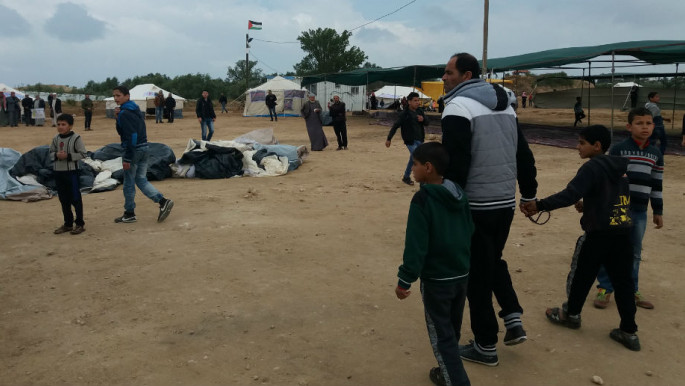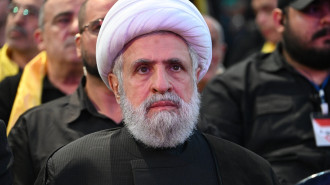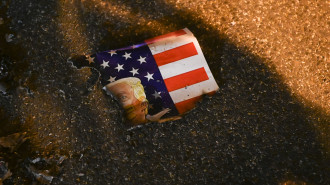Gaza's Great Return March is only the beginning of a fresh wave demanding Palestinian rights
March 30 has been a yearly occasion for decades since the Israeli government decided to confiscate thousands of acres of farm land owned by Palestinian Arabs of the Galleelie region in historical Palestine.
Since then, Palestinians including those living in Israel, the occupied Gaza Strip, West Bank, East Jerusalem and those out in nearby Arab states and worldwide countries, have been annually marking the land grab.
The political process between Palestinians and Israelis has reached a deadlock due to 25 years of futile negotiations between the two sides and now crowds of people in Gaza have decided to take out to border areas to peacefully declare their commitment to their original towns and villages, prior to 1948.
Their new way of marking comes concurrent with the US administration of President Donald Trump deciding to move the American embassy to East Jerusalem and turning a blind eye to the accelerated illegal Israeli settlements on occupied Palestinian territories.
On five different locations, designated by the Hamas-led higher committee for the Great Return March, tens of thousands of Gaza's two million residents, including men, women and children, as well as entire families, marched on Friday towards farm lands, adjacent to the Israeli border fence.
In one of those five locations to the east of Alburaij refugee camp, in central Gaza Strip, many families representing tens of historical Palestinian towns and villages, raised the national Palestinian flag and sat in in tents erected by the march's committee, about six to seven hundred metres away from the Israeli border fence.
Fatma Hamdan, a 79-year-old woman from the historical Palestinian village of Alfalluja, about 29 kilometres away from Gaza, spoke to The New Arab, while sitting in one of the tents surrounded by family members, including daughters and grandsons.
 |
|
| Fatima Hamdan refuses to give up her right to return despite decades of displacement [Rami Munir] |
"Yes, I am here to say to the whole world, including America, Europe and Arabs, that we Palestinians have been suffering for about 70 years and that our lives have been desperate since then," she says.
"In a time where all Arab countries enjoy lives with absolute freedom, we continue to suffer. For how long will this continue? I call on America to fear God and act within justice, nothing but justice. I call on the Arab nations and others like European countries, to look at our situation and realise how difficult our lives are. They should all come to save us and help us return back to our homeland," Fatma urges.
 |
In a time where all Arab countries enjoy lives with absolute freedom, we continue to suffer |  |
Many other participants in the peaceful demonstrations on these border areas are of the new generations of Palestinian refugees.
The tents are a reminder of the Palestinian refugee problem that began with the Nakba or "catastrophe," when Israel forcibly displaced more than 700,000 Palestinians from their homes, during the 1948 Palestine war. Many Arab countries have since failed to restore the Palestinian homeland from the Israeli forces.
"I have always heard about an Israeli saying: 'Older Palestinians will die and younger Palestinians will forget,'" says 22-year-old Huda Abu Nasser.
"Of course they meant that we, the younger generation, will forget our original homeland. This is an absolutely and completely wrong assumption. As you see here, many young men and women are taking part in today's peaceful demonstration," the youngster adds.
"My original town of Palestine is the now Israeli city of Ashdod. With our resilience, strong conviction and belief of our homeland, we will one day return back to Ashdod," Huda tells The New Arab, as she moves around the tents with friends and family a few hundred metres away from the Israeli border fence in the eastern Alburaij refugee camp.
 |
I have always heard about an Israeli saying: 'Older Palestinians will die and younger Palestinians will forget.' Of course they meant that we, the younger generation, will forget our original homeland. This is an absolutely and completely wrong assumption |
 |
At another corner designated for the demonstration, Abu Mohammad Ala'our, a resident of the nearby Maghazi refugee camp, takes part in the protest along with his kids. Abu Mohammad is now 50-years-old and seems very hopeful about returning back to his ancestor's village of Aaqer.
"Actually, I am being accompanied by my children to this demonstration," he tells The New Arab.
"I want to teach my children that our original village of Aaqer cannot be forgotten. I have never been able to live in Aaqer due to the occupation, but it remains my eternal love and passion. We Palestinians will continue to defend our right to return back with whatever means at our disposal," Abu Mohammad says enthusiastically. Nearby a group of youngsters dig for a new tent to be installed on the same spot.
 |
|
| Thousands of Palestinians from all generations took part in the Great Return March, again showing that the right to return will never be lost through the generations [Rami Munir] |
Majority of Gaza-based political factions have promptly responded to the call for the Great Return March. It was announced last week by Dr As'ad Abu Sharekh, a veteran independent political activist and university professor, during a press conference near the Israeli checkpoint of Eritz, north of Gaza Strip.
"This march is merely the beginning towards the realisation of the Palestinian people's inalienable right to return to historical Palestine. United Nations General Assembly resolution 194 of 1949 clearly stipulates that Palestinians, displaced by force from their own lands, have the right to return back and be compensated for the deprivation," says Abu Sharek, representative of the Palestinian community, including political factions and various families' chiefs.
Such an unprecedented Gaza-based activity is said to be the first of it's type in the past decade and according to organisers, it will continue until May 15, which marks the 70th anniversary of the Palestinian Nakba.
 |
United Nations General Assembly resolution 194 of 1949 clearly stipulates that Palestinians, displaced by force from their own lands, have the right to return back and be compensated for the deprivation |  |
Why this time?
Asked by The New Arab as to why such an activity takes place this time, veteran Gaza-based political analyst and leading academic, Dr Mahmoud Alajramy, responded: "This constitutes a powerful message from the Palestinian people to many concerned parties that the Palestinian question remains the core cause in the region and the world.
"Palestinians, particularly the refugee population, realise no breakthrough has come about in any political effort. As you know, the United States, which is supposed to be the patron for peace, has taken a very dangerous decision when it declared the occupied East Jerusalem as the capital of the Israeli occupation state," Dr Alajramy adds.
"The people now just need to speak out and respond with their own way to the worsening political conditions. I do not think that these demonstrations will stop, but rather will continue until the people seriously go back to their homeland."
Israel’s brutal reaction
Reactions to the march have been at various levels. Israeli army, stationed on the border lines with Gaza, responded by using lethal force against peaceful protesters. Seventeen Palestinians were killed during last week's protests, two others have been killed by Israeli forces in Gaza this week. Another 1,500 were wounded during the protests.
The massacre on Friday was the deadliest day since Israel’s 2014 assault on Gaza during Tel Aviv’s Operation Protective Edge. Smaller protests have continued since, with thousands expected to take to the streets again on Friday.
Israeli military officials have already threatened to use force to disperse demonstrators who approach the border fence. According to a statement by rights group B'Tselem: "Using force against unarmed civilians is a breach of relevant laws."
Arab and international countries have rejected what they called "Israeli excessive use of force." Russia has called on both Palestinians and Israelis to hold a summit meeting immediately. Kuwait on Friday called for an urgent meeting of UN's Security Council, which failed to condemn Israel actions due to the American veto. United Nations warned Israel against harming unarmed civilian protesters, particularly children. Both Jordan and Iraq condemned Israeli military crackdown on peaceful demonstrators in Gaza.
In the occupied Palestinian territories, a state of mourning has been declared by Palestinian Authority over the loss of lives in Gaza. Palestinian Authority's President Mahmoud Abbas called for ensuring protection for the Palestinian people.
As reactions to last Friday's massacre unfolds, Palestinians in the Gaza Strip continue to flow into border areas, determined to continue their peaceful protests and sit-ins.
As the 70th anniversary of Palestinian people's Nakba, or catastrophe nears, the higher committee for the Great Return March has asserted that border demonstrations will continue until May 15 to mark this prominent day. 
Rami Almeghari is a Palestinian freelance journalist living and working in Gaza.
Follow him on Twitter: @writeralmeghari




 Follow the Middle East's top stories in English at The New Arab on Google News
Follow the Middle East's top stories in English at The New Arab on Google News


